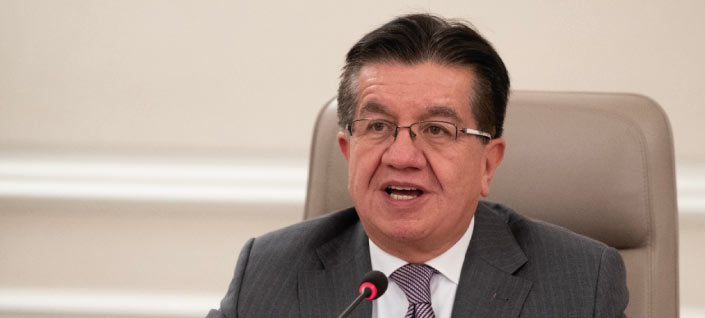Source: Ministry of Health and Social Protection of Colombia
In the face of the social, economic and cultural reactivation that Colombia will experience as of June 8, the Minister of Health and Social Protection, Fernando Ruiz announced that through Resolution 777 of 2021 all the protocols that had been established and were being developed through Resolution 666 of 2020 and other administrative acts that existed for each productive and social sectors are eliminated.
“This changes all the measures in a significant way that had been implemented until now”, said Ruiz Gómez, adding that among the main modifications is the elimination of the CoronApp requirement for domestic flights.
In this regard, he pointed out that as air traffic has been increasing, it has been observed that the lines of the airports become an agglomeration mechanism, so that Coronapp’s benefit was reduced. At the same time, the option of requesting a PCR test to enter the country is eliminated at airports.
Massive events
Additionally, this new resolution also addresses the occupation of beds in Intensive Care Units (ICU). “As long as a municipality is above 85%, all restrictive measures are maintained, especially in what has to do with bars, discos, events and crowds”, the minister explained.
He added that when a municipality falls below that 85% of ICU occupancy, opening possibilities are generated with capacity adjusted to the progress of the National Vaccination Plan. “A city less than such a percentage can start with 25% of capacity for open public events, even in closed events recommendations are generated where the minimum distance can be one meter, which increases the capacity”, he said, indicating that this is how they benefit places of worship, gyms, etc.
For such scenarios there are special measures such as the use of face masks, which is reinforced in the new regulations, ventilation, washing and disinfection of hands, the new minimum distance between people and indications for self-care.
Ruiz also pointed out that in the case of the match of the Colombian National Soccer Team next Tuesday, the conditions are in place to have an audience based on a 25% capacity. “Barranquilla is a city that has already decreased in affectation”, said the minister, adding that the new administrative act contemplates what is known as a resilience index, to which he indicated that “due to the fact that cities can border the 85% of ICU occupancy, the index takes into account the capacity of the health services at the moment and the vaccination.”
Faced with the above, he specified that there are cities that are more advanced in the pandemic, which already have a greater impact, such as Barranquilla, Leticia or Montería. “So to avoid that coming and going of 85% that can occur, with the resilience index it is possible to define if a city already has a stable percentage of affectation in time that allows greater forward capacity”, said the minister.
A fourth peak
With the new measures, Ruiz made it clear that “this does not mean in any way that the epidemic has ended, we are precisely in the hardest moment of the third peak and there is a high probability that we will have a fourth or fifth peak”, he warned, pointing out that to the extent that there is greater natural immunity and that vaccination advances, mortality will be significantly reduced.
For the head of the Health ministry, the social demonstrations and the current agglomerations that are being seen in the country will be triggers for an eventual fourth peak. “The new measures what they seek is to organize ourselves a little more and have a general bio-safety protocol that allows the reactivation of activities as important as education”, he said.
In this regard, he indicated that once the complete vaccination of teachers has been achieved, all the conditions will be in place for there to be face-to-face return of classes in schools. “This would be around July 15”, Ruiz added.
Vaccination
The minister highlighted how cities have advanced significantly in the National Vaccination Plan, “there are also municipalities that have taken second-dose vaccines to apply as the first dose, which implies significant demands and growth”, he stated.
He reminded the general public that yesterday 580,000 Pfizer vaccines arrived in the country and today another 500,000 will arrive from the same laboratory. Tomorrow a million vaccines will arrive from AstraZeneca and next Sunday another million doses of vaccines from Sinovac.
“As they arrive, we will be distributing them,” he said, and specified that what Colombia is looking for at the present time is to increase the speed of vaccination, which indicates that a city may deplete its stock of vaccines.
Faced with vaccination by private parties, the minister said that June 15 was set as the date for the opening of vaccination by private parties. “At this time we already have an agreement with a significant number of unions so that vaccines are acquired through the contract that the National Government has with Sinovac, where progress is being made in the acquisition of 2.5 million vaccines,” Ruiz reported.
The minister also pointed out that this week a resolution will be issued that refines aspects for the vaccination of private individuals “and we are awaiting the programming of shipments from Sinovac. I would hope that by the end of June vaccines will be arriving for vaccination by private entities”, he specified.

